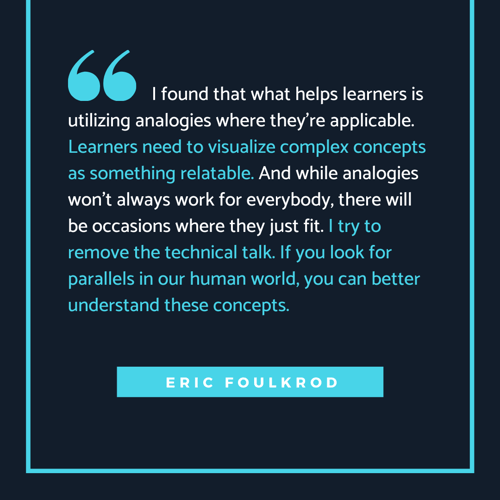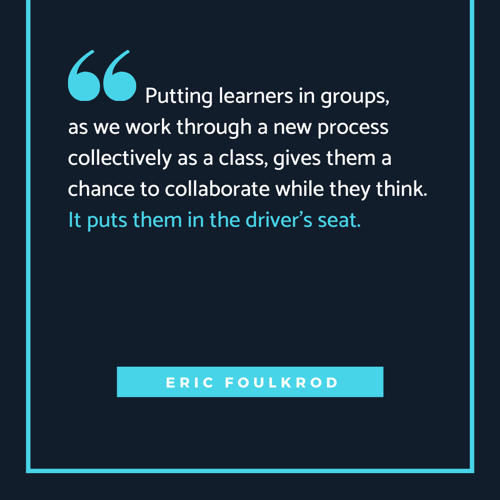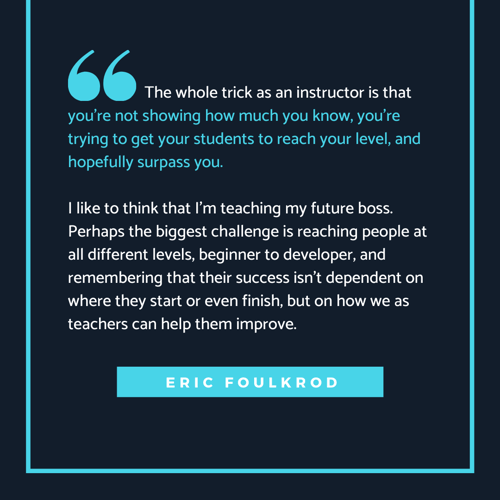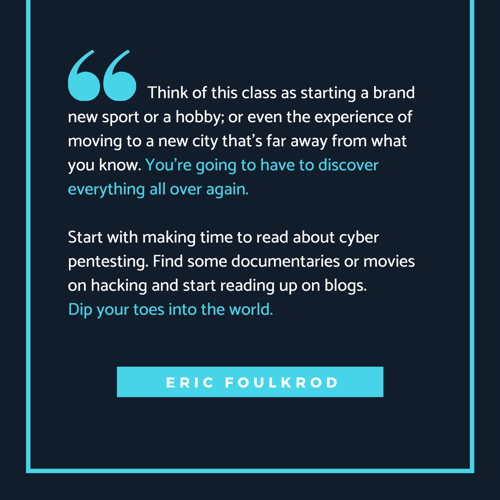Divergence Blog
Latest
- Red vs Blue: Decoding Cybersecurity Team Roles
- From Teacher to Tech Pro: Your Guide to a Rewarding Career Transition
- Navigating the VET TEC Pause: Choosing the Right Path for Tech Education.
- The Future of Work in the Age of Quantum Computing and AI
- What is Capture the Flag?
- KQL vs SQL
- How to Advance Your Career with Advanced Postgres
- Alumni Series: How Michael Williams Became a Cybersecurity Pentester
- A Veteran Success Story with Antonio Grant
- Leveraging a Cybersecurity Bootcamp to Launch a Career in Tech
Meet Our Instructor: Eric Foulkrod, CompTIA Veteran Sea Dog
“As I began to understand how networking and security worked, it seemed more and more magical. It was simple but also complex.”
—Eric Foulkrod
Eric Foulkrod is a creative who spent his early career in advertising and marketing before transitioning into teaching. Today, he is an instructor for CompTIA Net+, Sec+ and CyberPenTest at Divergence Academy.
Eric, thank you for joining us on our Instructor Perspectives series! Will you please briefly describe your background and what you did prior to Divergence?
My background is in advertising, actually. I worked in advertising and marketing for the first 10 years after graduating college. Then I did freelance for quite some time. But with the advent of Instagram and all the new things that Photoshop can now do, people now have so many high-level design skills; which is what led to me teaching for a company called New Horizons.
There was a certain point in time, while working for New Horizons, where the job showed less of a future. My boss approached me about exploring something a little more challenging. She asked me if I would be interested in pursuing hacking. I was hesitant. I didn't think I would like it, but once I got into it, it turned out that everything I thought I wouldn't like, I did.
As I began to understand how networking and security worked, it seemed more and more magical. It was simple but also complex. It was the total opposite of what I thought would suit me.
Thank you for sharing. How did this lead to you teaching here at Divergence Academy?
I got contacted in April. That was right after the pandemic prompted lockdowns in most places—so I was excited to hear from somebody.
I did what I advise a lot of my students to do. It’s crucial to showcase in your LinkedIn heading not only where you are or where you've been, but also where you want to go. I’d been instructing online since 2007 or 2008, and, in my heading, I mentioned that I was into cloud computing, data science, and AI.

And the reason why I mention the pandemic is that when I was hired by Divergence, they had just begun to move to online remote classrooms. They were just figuring out what to do and how to execute, and that’s what I was doing in 2008…. so you could say I helped pioneer the online teaching aspect. I have the battle scars to prove it.
Oh wow, so you were at the forefront of helping Divergence pivot from live in-classroom training to fully online, remote-live training.
I definitely was. I was one of the first instructors they took on who was already comfortable with online teaching. Divergence did a great job of figuring a lot of things out on their own with the migration. It was pretty amazing to see.
Taking one giant step back, do you mind sharing what classes you were instructing prior to joining Divergence?
Before Divergence, I did the whole gamut. At one point, I was primarily teaching CompTIA to mostly veterans. It was this special program where we would do A+, followed by Net+, and then Security+. And each of these classes lasted a month. We would then move into Windows Server, which is made up of three classes, each lasting about a month.
Variations of that program transpired over the course of about four years. When that program ended, I went back to teaching the same stuff I did back in 2003; which included everything from Outlook and Excel to Visual Basic, SQL, cloud, and other fundamentals.
Because I've been doing this kind of teaching for so long, I was able to dabble in various subjects. But the downside of dabbling in various subjects is that it's hard to go deep. So eventually, I left that job to strike out on my own and see what would happen—and that’s when Divergence got in touch with me.
Given this kind of background in teaching, could you walk me through your teaching style?
If you were to ask this question of my learners, a lot of them would say: “Eric uses a lot of analogies.”
I found that what helps learners is utilizing analogies where they’re applicable. On the slides, you get a lot of words, but learners need to visualize complex concepts as something relatable. And while analogies won’t always work for everybody, there will be occasions where they just fit.
Let’s take Dynamic Host Configuration Protocol (DHCP) for example. When your device - a phone or computer - connects to a network, it has to go through DHCP. That connection is like a conversation.
Say you go to a friend’s house, and you connect your phone to their WiFi. The moment when you plug in their WiFi password on your phone, it’s like your phone initiates a conversation. Your phone says, “Is there a DHCP server out there?” And then every DHCP server responds with: “Yeah. What do you need?” That’s when your phone communicates that they need an IP address, and it says that to the first DHCP that replies.
To extend that analogy, it's a little bit like going to a bar and trying to pick somebody up. But then one of my learners will speak up and say “no, that sounds more like a paid transaction.” That’s how it goes in class.
I try to remove the technical talk. Because if you look for parallels in our human world, you can better understand these concepts. They become relatable.

What’s an average day in your class like?
I usually open with questions, and about half the time you have questions that take you down a completely different path. That gives the learners a chance to direct where the discussion goes.
If there are no questions, I try to bring up a current event. In the security field, there’s always something happening. So I try and make it interesting or relatable to catch people's attention and hopefully spark some interest. When possible, I like to make sure that it’s a nice transition into the material I plan to teach that day. Then throughout the class, it all boils down to talking with the learners and facilitating conversation.
This week, we went a bit into the GameStop incident. You can take these things and usually find some way to relate and frame them as part of a story.
Other times, I provide scenarios. In my current Security+ class, I asked the question: if your computer is connecting to a network, what is happening? How can we attack that?
My delivery is a little more improv with a lot of me writing things down, drawing out diagrams, demo-ing things, and going straight to the code.. The core of it is that I try to interact a lot with the learners. If I can't interact with them all the time, I offer them some quick tools they can use. For starters, I show them Kali Linux as often as I can. It’s in our labs and they can get their own copies for free. It has just about every security tool that’s out there. Or TAILS operating system, which is for privacy. I always take them to nmap.org and gnupg.org. If you want to know security, learn GNUPG. Then there’s also blogs, live threat maps, and vulnerability databases.
Typically, how long are your classes?
We start at 9AM CT and run all the way to 6PM CT. It’s a VERY long day in the training world.
Like a full-time job. I guess that segues into my next question: how do you keep them engaged in a virtual classroom environment?
I always try to make sure they know when we're going to have a break. When you’re teaching these long classes, you need to understand that people have a life. They sometimes have things that they have to do. So, by being clear with what our schedule is, I feel that’s a good way to give them time to deal with basic life things like running errands. I also make sure to provide them ample lab time to run through the practices on their own.
It also helps to make everything as light and as conversational as possible. You want to avoid an info dump. That’s why I use analogies.
So aside from the analogies, are there any challenges or games that you set up during lab time to help with learner engagement?
That’s actually an area I am looking into and working on improving. One of the things Case [Divergence Academy’s Chief Academic Officer] is pushing us towards is to put the learners in their own group. A lot of the time, learners have no problem talking with one another, because they’re peers. But as soon as the instructor shows up, they'll be quiet.
Putting them in groups, as we work through a new process collectively as a class, gives them a chance to collaborate while they think. It puts them in the driver’s seat.

I've heard about the small breakout groups where learners have sub-channels in MS Teams, and the instructors hop in and out.
Yes. That setup allows learners to really collaborate amongst each other and figure out exercises. It provides the space where they can spearhead their own learning.
What would you say you enjoy most about your work? What inspires you?
Seeing learners in a better place, watching them succeed or pursue a career. One of the things I now tell all my learners is that, even just sitting through this stuff and doing what you can to pay attention, it’s going to do something for you.
What would you say are your biggest challenges teaching in a remote-live classroom setting?
I mentioned earlier that I've been doing this for a long time and in all sorts of different formats. But there are times where it really feels like you’re the only one there. And you wonder if there’s anyone listening to you.
I honestly think that one of the things about online teaching is that it doesn't really do away with a lot of the problems that you have in a live classroom. The whole trick as an instructor is that you’re not showing how much you know, you’re trying to get your students to reach your level, and hopefully surpass you.
I like to think that I’m teaching my future boss. Perhaps the biggest challenge is reaching people at all different levels, beginner to developer, and remembering that their success isn’t dependent on where they start or even finish, but on how we as teachers can help them improve.
The other issue, one I’m spending a lot of time on is, let’s say I do a great job teaching something, and at the time it totally makes sense. Sure, that’s great, but what’s really important is remembering it later. So these things, whether you’re online or in the classroom, will always be a challenge. Teaching, regardless of format, is still teaching.
How about the benefits of a remote-live classroom?
What I’ve found is that, all things being equal, online teaching offers you tools you wouldn’t have in a live classroom. The chat window for instance. People who normally wouldn't want to talk out loud are encouraged to type into the chat window.
So while you have less physical contact with people and you don't get the audience feedback that you would receive in a live classroom, it's almost easier to engage people when they're a thousand miles away.

Were there any proud teaching moments that have really stuck out?
Because the classes I’m teaching are based on the certifications the learners need, any time somebody schedules an exam, that makes me proud. Being informed that one of my learners registered to take the certification is validating. That’s them taking the initiative and demonstrating how serious they are about the course.
Looking towards the future, what would you love to see to better connect remote classroom engagements?
One of the things I spend a lot of time thinking about is augmented reality (AR) and virtual reality (VR). The idea that you could do a 360 view of your virtual classroom would just be cool. Then there's of course, the gamification of things.
Do you have any advice for learners interested in enrolling in our cyber pentest program and pursuing this as a possible career path?
There are two points to consider. First, what steps do you go through to get involved? Sign up for the class, reach out, and make your intentions known.
The second would be to find some way of getting ready. Think of this class as starting a brand new sport or a hobby; or even the experience of moving to a new city that's far away from what you know. You're going to have to discover everything all over again.
Start with making time to read about cyber pentesting. Find some documentaries or movies on hacking and start reading up on blogs. Dip your toes into the world.

We are the leading vocational trade school for emerging technologies with industry experts as our instructors. Gain relevant skills and meet the demands of an evolving landscape by signing up for our courses today.
View our course catalog or reach out to us and speak to a member of our team today!
